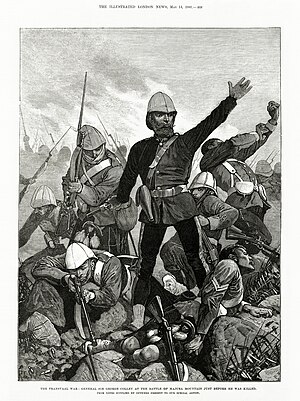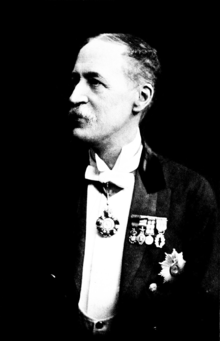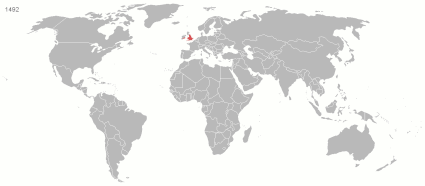Portal:British Empire
The British Empire Portal
The British Empire comprised the dominions, colonies, protectorates, mandates, and other territories ruled or administered by the United Kingdom and its predecessor states. It began with the overseas possessions and trading posts established by England in the late 16th and early 17th centuries. At its height in the 19th and early 20th centuries, it was the largest empire in history and, for a century, was the foremost global power. By 1913, the British Empire held sway over 412 million people, 23 percent of the world population at the time, and by 1920, it covered 35.5 million km2 (13.7 million sq mi), 24 per cent of the Earth's total land area. As a result, its constitutional, legal, linguistic, and cultural legacy is widespread. At the peak of its power, it was described as "the empire on which the sun never sets", as the sun was always shining on at least one of its territories.
During the Age of Discovery in the 15th and 16th centuries, Portugal and Spain pioneered European exploration of the globe, and in the process established large overseas empires. Envious of the great wealth these empires generated, England, France, and the Netherlands began to establish colonies and trade networks of their own in the Americas and Asia. A series of wars in the 17th and 18th centuries with the Netherlands and France left Britain the dominant colonial power in North America. Britain became a major power in the Indian subcontinent after the East India Company's conquest of Mughal Bengal at the Battle of Plassey in 1757. The American War of Independence resulted in Britain losing some of its oldest and most populous colonies in North America by 1783. While retaining control of British North America (now Canada) and territories in and near the Caribbean in the British West Indies, British colonial expansion turned towards Asia, Africa, and the Pacific. After the defeat of France in the Napoleonic Wars (1803–1815), Britain emerged as the principal naval and imperial power of the 19th century and expanded its imperial holdings. It pursued trade concessions in China and Japan, and territory in Southeast Asia. The "Great Game" and "Scramble for Africa" also ensued. The period of relative peace (1815–1914) during which the British Empire became the global hegemon was later described as Pax Britannica (Latin for "British Peace"). Alongside the formal control that Britain exerted over its colonies, its dominance of much of world trade, and of its oceans, meant that it effectively controlled the economies of, and readily enforced its interests in, many regions, such as Asia and Latin America. It also came to dominate the Middle East. Increasing degrees of autonomy were granted to its white settler colonies, some of which were formally reclassified as Dominions by the 1920s. By the start of the 20th century, Germany and the United States had begun to challenge Britain's economic lead. Military, economic and colonial tensions between Britain and Germany were major causes of the First World War, during which Britain relied heavily on its empire. The conflict placed enormous strain on its military, financial, and manpower resources. Although the empire achieved its largest territorial extent immediately after the First World War, Britain was no longer the world's preeminent industrial or military power. In the Second World War, Britain's colonies in East Asia and Southeast Asia were occupied by the Empire of Japan. Despite the final victory of Britain and its allies, the damage to British prestige and the British economy helped accelerate the decline of the empire. India, Britain's most valuable and populous possession, achieved independence in 1947 as part of a larger decolonisation movement, in which Britain granted independence to most territories of the empire. The Suez Crisis of 1956 confirmed Britain's decline as a global power, and the handover of Hong Kong to China on 1 July 1997 symbolised for many the end of the British Empire, though fourteen overseas territories that are remnants of the empire remain under British sovereignty. After independence, many former British colonies, along with most of the dominions, joined the Commonwealth of Nations, a free association of independent states. Fifteen of these, including the United Kingdom, retain the same person as monarch, currently King Charles III. (Full article...)Selected article -The Chilembwe uprising was a rebellion against British colonial rule in Nyasaland (modern-day Malawi) which took place in January 1915. It was led by John Chilembwe, an American-educated Baptist minister. Based around his church in the village of Mbombwe in the south-east of the colony, the leaders of the revolt were mainly from an emerging black middle class. They were motivated by grievances against the British colonial system, which included forced labour, racial discrimination and new demands imposed on the African population following the outbreak of World War I. The revolt broke out in the evening of 23 January 1915 when rebels, incited by Chilembwe, attacked the headquarters of the A. L. Bruce Estates at Magomero and killed three white settlers. A largely unsuccessful attack on a weapons store in Blantyre followed during the night. By the morning of 24 January, the colonial authorities had mobilised the Nyasaland Volunteer Reserve (NVR) and called in regular troops from the King's African Rifles (KAR). After a failed attack by KAR troops on Mbombwe on 25 January, the rebels attacked a Christian mission at Nguludi and burned it down. The KAR and NVR captured Mbombwe without encountering any resistance on 26 January. Many of the rebels, including Chilembwe himself, fled towards Portuguese Mozambique, hoping to reach safety there, but many were captured. About 40 rebels were executed in the revolt's aftermath, and 300 were imprisoned; Chilembwe was shot dead by a police patrol near the border on 3 February. (Full article...) Selected image The Transvaal War: General Sir George Pomeroy Colley at the Battle of Majuba Mountain just before he was killed. Did you know
Related portalsCommonwealth Realm Other former British territories Selected biography - Sir Herbert Hope Risley KCIE CSI FRAI (4 January 1851 – 30 September 1911) was a British ethnographer and colonial administrator, a member of the Indian Civil Service who conducted extensive studies on the tribes and castes of the Bengal Presidency. He is notable for the formal identification of the centuries old established caste system of the entire Hindu population of British India in the 1901 census, of which he was in charge. As an exponent of scientific racism, he used anthropometric data to divide Indians into seven races. Risley was born in Buckinghamshire, England, in 1851 and attended New College, Oxford University prior to joining the Indian Civil Service (ICS). He was initially posted to Bengal, where his professional duties engaged him in statistical and ethnographic research, and he soon developed an interest in anthropology. His decision to indulge these interests curtailed his initial rapid advancement through the ranks of the Service, although he was later appointed Census Commissioner and, shortly before his death in 1911, became Permanent Secretary at the India Office in London. In the intervening years he compiled various studies of Indian communities based on ideas that are now considered to constitute scientific racism. He emphasised the value of fieldwork and anthropometric studies, in contrast to the reliance on old texts and folklore that had historically been the methodology of Indologists and which was still a significant approach in his lifetime. (Full article...) Evolution of the British EmpireSubcategoriesWikiProjectsBritish Empire and Commonwealth of NationsLegend
Current territory · Former territory
Latin America and the Caribbean
Things to doBritish overseas territoriesAssociated WikimediaThe following Wikimedia Foundation sister projects provide more on this subject:
| |||||||||||||||||||||||||||||||||||















